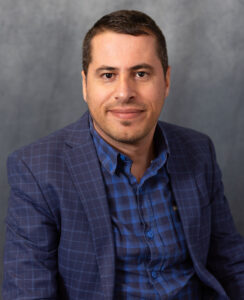Scholar Voices Feature
Rfat Advocates for Economic Integration of Refugees and Asylees with Disabilities in The Lancet
By Mustafa Rfat | December 2024
I am thrilled to share that my article, Refugees and Asylees with Disabilities: A Call for Economic Integration, has been published in The Lancet, one of the highest-ranking journals in the world. The article focuses on the intersection of disability and immigration, advocating for the economic integration of refugees and asylees with disabilities through equitable access to employment programs, workplace accommodations, and other essential resources. As a proud McDonnell Scholar, I am deeply grateful for the opportunities and support provided by the Academy, which have significantly contributed to my professional growth and ability to engage in impactful research. Read the article here: https://www.thelancet.com/journals/lancet/article/PIIS0140-6736%2824%2902375-4/fulltext.
Empowering Refugees and Advancing Global Leadership: Insights from ACRM and CSWE Conferences
By Mustafa Rfat | November 2024
During my recent participation at two national conferences—the American Congress of Rehabilitation Medicine (ACRM) and the Council on Social Work Education (CSWE)—I had the opportunity to advance the McDonnell International Scholars Academy’s mission to foster global leadership, broaden perspectives, and drive impactful community change. These gatherings provided a valuable platform to present my latest research on the social and economic barriers that refugees with disabilities (RWDs) face in the U.S. and allowed me to expand professional networks with like-minded scholars and practitioners.

At the ACRM conference, I shared insights from my research alongside fellow members of the International Interdisciplinary Special Interest Group’s Refugee Empowerment Task Force. This task force serves as a crucial forum for dialogue between rehabilitation practitioners and community leaders, all dedicated to empowering displaced and conflict-affected populations. Together, we brainstormed sustainable solutions, such as developing early education programs to equip refugees for successful integration in the United States. This collaborative session highlighted the dedication of national leaders working tirelessly to support refugees and asylum seekers in overcoming significant challenges.
The CSWE conference further underscored the McDonnell Academy’s values. Presenting on community-based participatory methods, I engaged in valuable discussions on inclusive research practices for marginalized populations. My exchanges with academics and practitioners from across the country provided fresh perspectives on improving disability rights and immigrant inclusion, broadening my approach to both research and advocacy. Additionally, reconnecting with other McDonnell Scholars allowed us to reflect on our shared commitment to addressing pressing social challenges and advocating for transformative policies.
These experiences have strengthened my commitment to the Academy’s ideals, providing insights that will continue to shape my work on refugee empowerment and disability advocacy. Thanks to the Academy’s support, I am better equipped to champion these causes on a national stage.
Scholar Highlight
Social Identities Matter
In 2011, I learned that social identities matter. I had just arrived in Mobile, Alabama, with the determination to do everything in my power to learn English and attend college. Despite physical and mental exhaustion from my journey as a refugee from Iraq, I was hopeful about my future. The day after my arrival, I asked my interpreter to register me in school to learn English. Her response was strange, as she told me that not everyone could go to college. I was disappointed, but she was right. I was unaware of the challenges ahead of me, forgetting that I was not only a refugee but also a disabled Muslim living in extreme poverty. Any one of these identities could prevent me from achieving my dreams. However, my experience of living in brutal conditions at a refugee camp in Turkey had empowered me to face new challenges. I knew that education would be the most effective tool in sharing my story and reducing the disparities and inequalities I not only witnessed, but experienced, firsthand.
Later in my education, I came to learn about intersectionality and how a person’s different social identities can compound to create advantageous or disadvantageous situations. This concept is particularly crucial for those who are in power to understand, be aware of, and act on when needed.
People currently in charge of systems may feel that their systems are progressive or at a minimum adequate to suit the needs of the disadvantaged, but the system ignores intersectionality.
The system assumes that a disabled person has no additional identity or disadvantage to navigate. It assumes that all disabled people are the same.
One way to mitigate the disadvantages is to take a bottom-up approach. This model, “nothing about us without us,” which originated in disability studies, focuses on resolving issues by including the views of those who are excluded. The bottom-up approach provides space for people to learn firsthand about the importance of change to reduce discrimination, exclusion, and marginalization. Leaders who are interested in creating equity for marginalized people must have four values:
- Awareness. Through awareness, leaders can learn about the facts and realities of those who are included and oppressed.
- Advocacy. Through advocacy, leaders can take specific actions to improve the situation and mitigate the challenges marginalized people face on a daily basis.
- Equity and justice.It is important to note that without true equity we cannot reach justice for marginalized people.
- Inclusion. Full inclusion, ensuring and enabling people who are marginalized to become the decision-makers and leaders because personnel is policy.
The McDonnell International Scholars Academy is the perfect place to cherish these values. The Academy prepares leaders for the entire world, and as a result, the benefits go beyond our communities. Most importantly, the Academy includes scholars from all disciplines, which is another benefit of making scholars aware of injustices, teaching them advocacy skills, and encouraging them to learn about inclusion, justice, and equity. Every scholar and leader has an obligation to be intentional about learning these lessons and sharing the knowledge with others.
